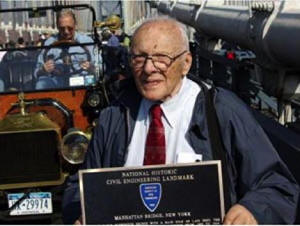
Bob
Olmsted, Chair of the History & Heritage Committee, Dies
at 85
 Robert
A. Olmsted, P.E., F. ASCE died on August 16, 2010 at
the age of 85. A direct descendant of Frederic Law
Olmstedóthe designer of New York City's Central ParkóBob
had over 60 years of experience in the planning, design
and construction of transportation facilities in the
United States, Latin America and Africa and was an
expert on transportation projects in the New York
Metropolitan Area.
Robert
A. Olmsted, P.E., F. ASCE died on August 16, 2010 at
the age of 85. A direct descendant of Frederic Law
Olmstedóthe designer of New York City's Central ParkóBob
had over 60 years of experience in the planning, design
and construction of transportation facilities in the
United States, Latin America and Africa and was an
expert on transportation projects in the New York
Metropolitan Area.
For
nearly 30 years, Bob served as the chair of the ASCE Met
Section's History & Heritage Committee and oversaw the
designation of many projects in the New York City area
as National Historic Civil Engineering landmarks
including the Manhattan Bridge, Queensboro Bridge and
Williamsburg Bridge, which were most recently dedicated
I as landmarks in April 2010.
The
principal author the Met Section's A Guide to Civil
Engineering Projects in and around fliew York City,
which was first published in 1997, Bob also served as a
contributing author to the updated and expanded second
edition published in 2009. He was the chair of the ASCE
Met Section's Transportation Group in 4 1970-71 (a
predecessor of the Infrastructure Group) and was a
former Director or the ASCE Met Section. Bob also served
as a delegate on the ASCE's Hoover Medal Board of Award
and a member of ASCE National's Membership Application
Review Committee.
A native New Yorker that grew up in Midtown Manhattan,
Bob studied civil engineering at Cornell University From
1941-1943 before he completed the United States Army's
Specialized Training Program in civil engineering at
Princeton University in 1944 and served as a soldier
during the liberation of the Philippines and the
occupation of Japan in World War II, He returned to
Cornell to complete his civil engineering degree in 1946
and later obtained a master's degree in civil
engineering the Polytechnic Institute of Brooklyn in
1953.
Bob started his career as a civil engineer for the
Triborough Bridge and Tunnel Authority in 1946 working
on the construction of the Brooklyn-Battery Tunnel. He
subsequently worked for the Port Authority of New York &
New Jersey, TAMS Consultants and the New York State
Office of Transportation before becoming the Planning
Director of the Metropolitan Transportation Authority in
1967, a position that he held for 22 years. After
departing the MTA in 1989, Bob remained semi-retired and
worked as a transportation consultant on a number of
projects including the Historical Survey of New York
City Transit Authority Properties and Access to the
Region's Core with Parsons Brinckerhoff, the JFK Light
Rail EIS with URS, and the Second Avenue Subway and
LaGuardia Airport Rail Access with DMJM +Harris, Between
1963 and 1994, Bob taught courses in Urban Mass
Transportation at Cooper Union, John Jay College,
Manhattan College, New York University and Polytechnic
Institute, In addition to his involvement with ASCE, Bob
was a member of the Institute of Transportation
Engineers, American Planning Association, Society for
Industrial Archeology, Regional Plan Association,
Transportation Research Board and Women's Transportation
Seminar.
He
was the recipient of the ASCE Met Section's Thomas C.
Kavanagh Service Award in 1985, the ITE Met Section's
Distinguished Member Award in 1999, the ASCE Civil
Engineering History and Heritage Award in 2004, the NYU
Wagner Rudin Center's Lifetime Achievement Award in 2006
and the APA Metro Chapter's Andrew Haswell Green Award
in 2008.
A memorial is planned for the fall.
Copyright © 1996 - 2010, American
Society of Civil Engineers



 Robert
A. Olmsted, P.E., F. ASCE died on August 16, 2010 at
the age of 85. A direct descendant of Frederic Law
Olmstedóthe designer of New York City's Central ParkóBob
had over 60 years of experience in the planning, design
and construction of transportation facilities in the
United States, Latin America and Africa and was an
expert on transportation projects in the New York
Metropolitan Area.
Robert
A. Olmsted, P.E., F. ASCE died on August 16, 2010 at
the age of 85. A direct descendant of Frederic Law
Olmstedóthe designer of New York City's Central ParkóBob
had over 60 years of experience in the planning, design
and construction of transportation facilities in the
United States, Latin America and Africa and was an
expert on transportation projects in the New York
Metropolitan Area.